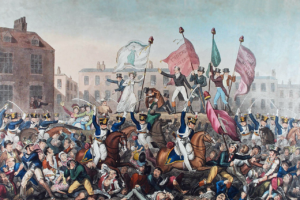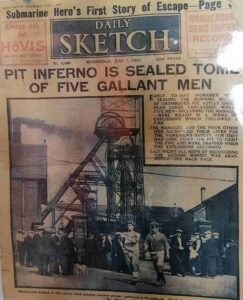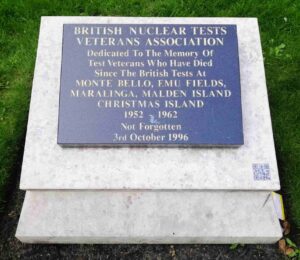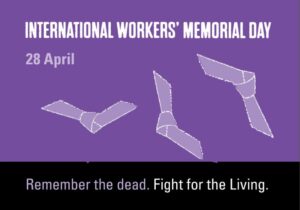A timeline of health and safety
1819: Peterloo Massacre, Manchester
August 16, 1819

The Peterloo Massacre took place at St Peter’s Field, Manchester, Lancashire, England on Monday 16 August 1819 when cavalry charged into a crowd of 60,000–80,000 who had gathered to demand the reform of parliamentary representation.
1833: HM Factory inspectorate formed
June 27, 1833
The first factory inspectors were appointed under the provisions of the Factories Act 1833. Initially their main duty was to prevent injury and overworking in child textile workers. The four inspectors were responsible for approximately 3,000 textile mills and had powers to enter mills and question workers. They were also able to formulate new regulations and laws to ensure the Factories Act could be suitably enforced. Despite serious opposition from contemporary politicians and employers, the factory inspectors were enthusiastic and were able to influence subsequent legislation relating to machinery guarding and accident reporting. By 1868 there were 35 inspectors and sub-inspectors, each responsible for a distinct geographical area. Changes to legislation during the period 1860 to 1871 extended the Factories Act to practically all workplaces and the inspectors took on the role of technical advisers in addition to their enforcement duties. Major technological developments, world wars and the changing nature of employment have provided a constant challenge to factory inspectors over subsequent years.
1835: Tolpuddle Martyrs
March 6, 1835
The Tolpuddle Martyrs were a group of six agricultural labourers in the village of Tolpuddle in Dorset, England, who were convicted of swearing a secret oath as members of the Friendly Society of Agricultural Labourers in 1834.
1842: Lune Street Massacre Preston
August 12, 1842
1843: Mines inspectorate formed
January 1, 1843
1845: Famine – Potato Blight First Reported in Ireland
September 13, 1845
Drochshaol: Between 1845-1852 nearly 25% of Ireland’s population died or emigrated partly due to the failure of the potato crop.
1868: TUC founded in Manchester
June 2, 1868
From 2-6 June 1868 the inaugural meeting of the TUC was held at the Manchester Mechanics Institute on Princess St.

1893: First women factory inspector appointed
June 27, 1893
1898: Match Girls’ Strike
July 1, 1898
Bryant and May, Match girls strike.
1914: Beginning of the Great War (World War I)
July 28, 1914
World War I begins which will see more than 17 million deaths and over 23 million wounded.
1915: Quintinshill rail crash
May 22, 1915
Quintinshill rail crash – 226 killed
1918: Armistice Day – Remembrance Sunday
November 11, 1918
The Armistice marks the end of the First World War and is now observed as Remembrance Sunday on the second Sunday each November.
1939: Astley Green Colliery Explosion
June 6, 1939
Astley Green, Lancashire – colliery explosion. A devastating blow to a small community and the families of five men who lost their lives in an underground explosion and fire. Still remembered today with an annual memorial.
1939: Start of World War II
September 1, 1939
World War II causes in excess of 75 million deaths worldwide with most being civilian fatalities.
1952: UK starts nuclear testing in Australia and the Pacific
October 3, 1952
From 1952-1963 the UK conducted 21 major nuclear tests and over 30 trials in Australia and the Pacific. The UK remains the only nuclear-testing power not to fully recognise and compensate affected veterans, their families and the indigenous populations.

1957: Windscale fire
October 10, 1957
Windscale (later Sellafield) in Cumbria, England where hundreds of people were made sick and later died from cancer-related illnesses. Similar to the Soviet Union 30 years later at the more serious Chernobyl incident, the UK government initially played it down and employed some censorship about the impact of the 3-day fire. With 21 serious accidents or leaks since opening, there’s still international concern about this site even though it is being decommissioned over the next 96 years.
1961: The Factories Act
March 28, 1961
The Factories Act of 1961 (effective 1 April 1962) brings together earlier factory acts aimed at governing the conditions for workers in factories. These included requirements in cleanliness, temperature, lighting, ventilation, numbers of workers, washing and toilet arrangements. The Act still has some relevance today in law but much of it has been superseded by the Health and Safety at Work Act of 1974.
1966: Aberfan spoils collapse killing 144
October 21, 1966
National Coal Board approved spoils had become unstable and collapsed on a school and houses in the village of Aberfan, Wales. The collapse killed 116 children and 28 adults with many survivors experiencing illnesses and PTSD.
1974: Flixborough chemical plant explosion
June 1, 1974
Flixborough (Lincolnshire) chemical plant explosion. The explosion could be heard over 30 miles away killing 28 workers, seriously injuring 36 and devastating families and the local community.
1974: Health and Safety at Work Act
October 1, 1974
Health and Safety at Work etc. Act 1974. The primary legislation governing workplace health and safety in the UK. Still in use today and sitting above the many Regulations that inform the Act. Essential for employers/ duty holders, local councils, workers, self employed, unions, the public and anyone with an interest in safer working practices.
1975: Health and Safety Executive (HSE) formed
January 1, 1975
From the 1974 Health and Safety at Work etc. Act the HSE is formed.
1975: Infected Blood Advice from W.H.O. to UK
May 13, 1975
From 1974 research led the World Health Organisation (WHO) to highlight the risks of importing blood products from countries with high rates of hepatitis. Despite strong advice to the UK, by 1978 it was importing up to 50% of blood products from overseas. It took until 2017 for the government to start an inquiry into the devastating effects infected blood had on medically vulnerable individuals and those requiring blood transfusions.
1977: The Safety Representatives and Safety Committees Regulations
March 16, 1977
The Regulations under the The Health and Safety at Work Act 1974 provide union safety reps with codes of practice and guidance. These include appointments, recognition and the functions of safety reps and safety committees including the right to be consulted. Operational from 1st October 1978.
1981: First Reported AIDS-related Death in the UK
December 12, 1981
Reported in the Lancet, the death occurred in London in October that year but an HIV transmission had been detected in the UK two years earlier.
1984: First edition of Hazards Magazine
September 3, 1984
Award-winning and highly respected Hazards Magazine rolls of the press and remains an essential resource for safety reps today.
1984: Bhopal Gas Disaster
December 2, 1984
From 2nd December 1984 onwards, the deaths from the Bhopal gas leak is estimated to be 20,000. Seen as the world’s worst industrial disaster hundreds of thousands were also injured and communities destroyed.
1985: Bradford Football Stadium Fire
May 11, 1985
Resulting in 56 deaths and nearly 300 injuries.
1985: Manchester Airport Plane Fire
August 22, 1985
The fire took hold on take-off killing 55 people mainly from smoke inhalation. The effect on families and survivors was immense but it also led to significant changes in aviation safety after maintenance and evacuation failings were reported.
1986: Chernobyl nuclear plant disaster
April 26, 1986
To date the world’s worst nuclear disaster killing 31 and affecting hundreds of thousands with cancers, illnesses, fertility problems and birth defects.
1987: Hazards Campaign Network Begins
September 6, 1987
Greater Manchester Hazards Centre (GMHC) is part of a national network called the Hazards Campaign which was set up in 1988. It draws together Hazards Centres, Occupational Health Advisory Services, safety reps, Trade Unions, specific safety campaigns, victims support groups and safety activists.

1987: Kings Cross Tube Station Fire
November 18, 1987
31 dead and over 100 injured due to fire which started underneath old wooden escalators.
1988: Piper Alpha Oil Rig Fire/ Explosion
July 6, 1988
Major fire and explosion on this North Sea oil rig led to 167 deaths.
1989: First International Workers Memorial Day
April 28, 1989
First declared in the US then later in the UK by the Hazards Campaign in 1992. Now recognised annually worldwide on April 28 to honour hundreds of thousands of people killed or injured at work.

1989: Hillsborough Stadium Disaster
March 4, 1990
With 97 deaths and 766 people injured at Hillsborough stadium it remains the UK’s deadliest sporting disaster. The impact on friends, family, survivors and British society cannot be underestimated. In the subsequent years, obfuscation and misrepresentations through submissions to inquiries, reports and the mainstream media compounded the grief of those affected by the tragedy.
1995: The RIDDOR Regulations
December 6, 1995
The Reporting of Injuries, Diseases and Dangerous Occurrences Regulations (RIDDOR) created and comes into effect on 1st April 1996. These regulations required a responsible person to report fatalities and certain workplace illnesses and injuries to the Health and Safety Executive (HSE). The 1995 regulations were later replaced by the weaker RIDDOR Regulations 2013. The 2013 regulations significantly reduced the reporting requirements as well as the list of reportable diseases and dangerous incidents.
1999: Ladbroke Grove Train Crash
October 5, 1999
The high-impact train crash killed 31 passengers and crew and injured more than 417. This was only two years after the Southall train crash which killed 7 and injured well over a hundred.
1999: Asbestos Sales Finally Banned in the UK
November 26, 1999
The last of the asbestos types (white) to be banned for sale, import or export after the 1985 bans (brown and blue) in the UK. Despite the ban asbestos is still in many buildings and products. It still continues to kill affected people today as well as their families, it remains legal in many countries around the world.
2001: 9/11 Terror Attacks USA
September 11, 2001
Terror attacks – New York, Virginia and Pennsylvania: 2977 members of the public, office, emergency, support workers killed with many more thousands injured or suffering long-term illness.
2002: First Annual European Week for Safety and Health at Work
October 21, 2002
First European Week for Safety and Health at Work and occurs in late October each year.
2002: The Control of Substances Hazardous to Health Regulations (COSHH)
November 21, 2002
Effective from 21 November 2002 COSHH is a set of regulations aimed at protecting workers from ill health when working with specific substances and materials.
2004: Morecambe Bay cockle picker deaths
February 5, 2004
At least 21 Chinese cockle-pickers drowned due to inexperience, being unfamiliar with the area and the language barrier.
7/7 London Bombings
July 7, 2005
A series of bombings on the London transport network killed 52 people and injured more than 790 others. The subsequent inquests pointed to failures in intelligence and communications before and during the response, placing victims and emergency services at further risk.
2005: Buncefield Oil Depot Explosion and Fire
December 11, 2005
Hertfordshire, England nearly 50 people injured when a fuel-air explosion caused 20 large storage tanks to ignite.
2006: Families Against Corporate Killers (FACK) launched
July 14, 2006
‘We didn’t vote to die at work so stop killing us!’ No-one should be killed at work and employers should not escape justice. Families Against Corporate Killers was set up by families of those killed by or at work.

2013: Rana Plaza Textile Factory Collapse
April 24, 2013
Bangladesh: 1,134 fatalities and more than double that with injuries. It came less than 10 years after the Dhaka garment factory collapse killing 73 in 2005.
2016: Didcot power station collapse
February 23, 2016
The ‘Didcot A’ power station which was due for demolition, collapsed killing 4 men and injuring 5 more with 47 treated for severe dust inhalation and trauma. As of late 2024 there’s still no conclusion to the investigation.
2017: Grenfell Tower Fire, West London
June 14, 2017
Kensington: The UK’s worst preventable residential fire in recent times saw 72 fatalities, 74 seriously injured with many other people affected. The related inquiry highlighted a series of failings in the management of the building. Nearly eight years on, no criminal prosecutions have been made as survivors and first responders face serious health concerns.
2018: Morandi Bridge Collapses
August 14, 2018
Genoa, Italy: 43 people killed, 16 injured with the collapse of the heavily used, poorly maintained bridge.
2020: First reported cases of Covid-19 in the UK (SARS-CoV-2)
January 31, 2020
The recent Covid-19 pandemic and the associated responses would see at least 240,803 deaths in the UK. More than 633,000 people were admitted to hospital and the ongoing effects of Long-Covid and the loss of loved ones is a daily reality for countless more people.
2022: Hottest Recorded Temperature in the UK
July 19, 2022
Coningsby, Lincolnshire holds the UK record for highest temperature recorded in the UK at 40.3c. Nine of the ten hottest recorded days in the UK ever have been since 1990.
2024: Novi Sad Railway Station Collapse
November 1, 2024
Novi Sad, Serbia, the main railway station canopy collapses killing 15 people and injuring 2. The investigation is still underway but it has triggered mass protests about corruption and cover ups in the country. A number of bosses and officials have been arrested over the incident. In the UK the Corporate Manslaughter and Corporate Homicide Act 2007 misses the mark on many fronts with accountability and executive level prosecutions somewhat lacking.
2024-25: 50 Years of the Health & Safety at Work Act and the HSE
January 1, 2025
October 2024 to January 2025 sees the 50th anniversary of the modern foundations of health and safety at work. The Act (see 1974 above) and the Regulatory body – the HSE were formed and changed workplace safety for good. The 50th anniversary was marred by increasing risks to worker safety due to a decade of seismic cuts to the HSE budget. The cuts have coincided with the increasing need to protect workers from climate change, air quality, Brexit, the ‘gig economy’, stress, Long-COVID and rising mental health concerns along with fewer HSE inspectors.
